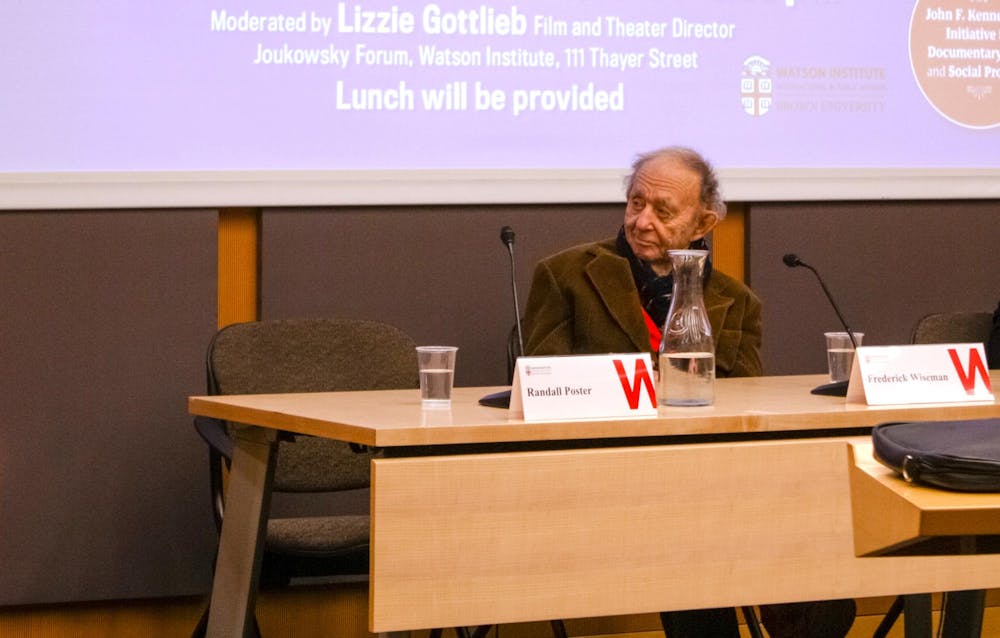Renowned filmmaker and documentarian Frederick Wiseman visited campus for a discussion of his recent film, “City Hall,” on Friday. Sponsored by the Watson Institute for International and Public Affairs’ “John F. Kennedy Jr. Initiative for Documentary Film and Social Progress,” the discussion explored Wiseman's prolific career and was moderated by fellow documentarian Lizzie Gottlieb.
“City Hall,” released in October 2020, is a four-and-a-half-hour documentary that explores Boston’s local government from fall 2018 to winter 2019. Through its long runtime, the work examines the minutia of city governance. From a focus on small community gatherings to important logistical meetings, the documentary examines both hardships and successes experienced by the city in realms including but not limited to housing, racial justice and climate change action. Exploring themes common to Wiseman’s work, the project yields insight into yet another significant American institution.
Wiseman has steadily emerged as one of the leading contemporary documentarians, partly as a result of his work’s sustained commitment to understanding myriad American institutions. “I have a knack of picking places that are open 24 hours a day as subjects,” Wiseman said in an interview with The Herald. “Filming is a sport, and you have to be in decent shape to run around.”
Wiseman’s motivation for creating “City Hall” was “to make as good a movie as I could make, based upon the experiences I had in Boston for twelve weeks.” Over those twelve weeks, Wiseman accumulated over 100 hours of footage.
Wiseman takes time to rewatch each sequence he has filmed for a project. “In order to find a dramatic structure, I have to try and think through the material,” Wiseman said. “I have to think that I understand what’s going on in a sequence — unless I think that I understand what’s going on, I can’t decide whether or not I want it.”
“The actual experience of filming is pretty much always the same across projects ... You take the risk of shooting a lot of film, and hope you find enough sequences from which you can edit a movie,” Wiseman reflected.
Being a part of the action is crucial to Wiseman’s craft: “You have to be prepared to shoot whatever is going on that you think might be of some interest to you, at all times of the day and night,” the director said.
A dedication to observation — or a fascination with reality — has proven a trademark of Wiseman’s work through the years.
“The first movie I made was in 1966, it was ‘Titicut Follies.’ I had the idea for that film because before I started to make movies, I taught law. I taught a course on law and medicine, and I took the students to various trials, parole board hearings, regular prisons and mental hospitals,” Wiseman said.
This role led Wiseman to documentary filmmaking, an outlet through which he could immerse himself in different communities, ultimately being able to create works that question what it means to be American.
Lizzie Gottlieb, a faculty member at the New York Film Academy, had the role of moderating Friday’s discussion with Wiseman. Gottlieb, who has achieved critical acclaim following the release of her 2022 film “Turn Every Page,” teaches Wiseman’s documentaries in her own filmmaking courses.
“I always teach Wiseman’s film ‘Welfare,’” Gottlieb said. “When my students are learning the film, they are terrified because that weekend they have to go out and shoot a film themselves. They’re watching ‘Welfare’ to learn from it, and to be inspired in terms of how to do it.”
“You watch films more accurately and more alertly if you are trying to figure out how they are made,” Gottlieb added.
Wiseman was brought to campus by the Watson Institute's John F. Kennedy Jr. Initiative for Documentary Film and Social Progress, which was started in 2020 as a means of engaging the Brown community in discussions of film as they relate to the study of politics and public policy. The initiative aims “to encourage students to express themselves in their search for an understanding of big societal challenges and to help students to become better and more critical consumers of documentary film,” said Edward Steinfeld, director of the Watson Institute and professor of political science.
“We’ve been wanting to bring Frederick Wiseman in for years, actually,” said Steinfeld. “We did an event with Frederick online (during the COVID-19 pandemic), but we were so happy to be able to bring him to campus for this in-person gathering.”
“There were so many people in the room,” Wiseman said. “And that underscores how meaningful it is to be able to interact face-to-face through these discussions.”
Correction: A previous version of this story misstated Frederick Wiseman's first name in the headline. The Herald regrets the error.





